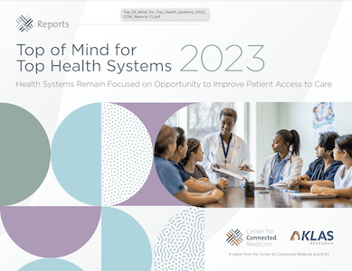Recently, Ed Marx of Marx Advisory invited Dan Dodson, System Director for Digital Health and Innovation at UNC Health, to his show EdTalks to discuss digital transformations in healthcare. Deemed a "digital evangelist" by Marx, Dan Dodson examined the current digital state of healthcare and how embracing these evolutions can improve the patient experience, streamline operations, and cut costs.
In this video, Marx and Dodson discussed vital areas of healthcare where implementing digital solutions, like mobile platforms, could benefit both patients and providers alike. In addition to these discussions, Dodson expanded on his role at UNC in supplying digital health outlets to rural and underdeveloped areas.
While we suggest watching the entire conversation (see below), here are a few key takeaways that we found interesting.
The Future of Digital Healthcare is Mobile
Of course, what stood out to us the most was Dodson's and Marx's take on the use of mobile platforms in healthcare. As mobile systems continue to assist in every facet of our lives, both Dodson and Marx shared a common belief that these platforms could benefit the healthcare industry if appropriately utilized. In his role as System Director for UNC, Dodson shared first-hand experience of the benefits of implementing a mobile app for patients and the seemingly endless capabilities they can offer.
"Nobody answers the phone, nobody talks on the phone, everybody texts. And that's not just your young demographic, that's eight to eighty" - Dan Dodson.
The Impact of Wayfinding on Digital Health
Dodson went on to discuss how wayfinding plays an integral role in digital healthcare and how it's changed over the last few years. As more and more hospitals adopt digital solutions to engage their patients, reliable wayfinding plays a crucial role in a mobile platform. For example, without the proper direction, patients become frustrated and confused, as 67% of them think that easily navigating their healthcare facility is very or extremely important. This further cements Dodson's point that wayfinding on mobile should be more extensive than simply directing patients to their doctor's front door. Patients require a digital wayfinding platform that can guide them step by step through every square inch of their healthcare facility, saving them precious time.
While this vision of wayfinding is nothing new, it's a far cry from the times Marx could recall.
"I remember back in the old days, there was color-coded tape on the floor to guide you." - Edward Marx.
We've surely come a long way from following the yellow tape road.
The Future of Digital Healthcare
Finally, Marx asked Dodson what he predicted the future would bring for digital healthcare. The answer was simple: AI.
Dodson was eager to share some of the work UNC has been doing with Microsoft and Epic with artificial intelligence. Tools such as ChatGPT for chart messaging and Enlitic for data accuracy can allow healthcare professionals to improve operational efficiency.
Despite all its potential, Dodson stressed the need to utilize AI safely.
"We're really finding ways to utilize that (AI) safely and sort of in a controlled way. So we certainly aren't just throwing it out there to the masses." - Dan Dodson.
Dan Dodson Interview Wrapped-Up
Dan Dodson's insightful discussion on EdTalks highlighted the transformative impact of digital solutions in healthcare. Embracing mobile platforms can enhance patient engagement, streamline operations, and address vital aspects like wayfinding. Dodson's emphasis on the future involving AI underscores the potential for seamless patient experiences, emphasizing the importance of deploying it cautiously in controlled environments.


